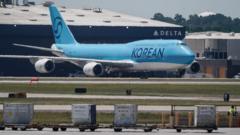Why Are South Korean Workers Heading Home After US Raid?

Published: 2025-09-12 02:40:14 | Category: technology
Over 300 South Koreans, who were detained in a significant immigration raid at a Hyundai plant in Georgia, are set to return home, highlighting the complexities surrounding foreign worker policies in the US. The raid has sparked concerns over its implications for investment and worker mobility, especially as South Korean firms traditionally support overseas operations with skilled workers.
Last updated: 23 October 2023 (BST)
Key Takeaways
- More than 300 South Koreans detained in an immigration raid are returning home.
- The raid is causing concerns over future US investments by Korean companies.
- Discussions are ongoing between South Korea and the US regarding visa options for workers.
- Hyundai's factory opening is delayed by at least two to three months due to the raid.
- The operation has raised questions about the US's immigration policies and their impact on foreign investments.
The Immigration Raid: Context and Consequences
The recent raid at the Hyundai plant in Georgia involved the detention of 475 individuals, with over 300 being South Korean nationals. This operation was part of a broader enforcement strategy by US immigration authorities targeting illegal employment practices. The raid's timing is particularly significant, as it coincides with South Korea's ongoing negotiations with the US regarding trade and investment, raising alarms about its impact on bilateral relations.
The Impact on South Korean Firms
South Korean President Lee Jae Myung has expressed concerns that the raid could deter future investments in the US, stating that companies may become "very hesitant" to engage in American markets if such actions continue. The detainment of workers has not only caused immediate disruptions but also casts a long shadow over the future of manufacturing partnerships between South Korea and the US.
Hyundai's Response and Factory Delays
José Muñoz, Hyundai's chief executive, has indicated that the raid will delay the opening of the new factory in Georgia by at least two to three months. The factory represents one of the largest foreign investments in the US, and the delay poses challenges for the company's production schedules and financial forecasts. Many of the detained workers were mechanics employed by a contractor to install production lines, thus highlighting the reliance of foreign companies on skilled labour from their home countries.
Negotiations for Visa Options
In response to the raid, the South Korean government is actively negotiating with US officials to secure more favourable visa conditions for its workers. South Korean Foreign Minister Cho Hyun has called for the US Congress to support new visa categories or increase quotas for Korean firms. This move reflects the urgent need to establish a more predictable framework for the movement of skilled workers, which is crucial for ongoing and future investments.
Potential Changes in US Immigration Policy
The US White House has defended the raid, asserting that the operation was necessary to uphold immigration laws. President Donald Trump has suggested that foreign companies will be able to bring workers into the US more easily if they comply with these laws. This stance indicates a potential shift in how the US might balance its immigration policies with the needs of foreign businesses.
Public and Media Reaction
The reaction in South Korea has been one of shock and concern. Major media outlets have described the raid as a significant event that could have lasting implications for business operations in the US. The Dong-A Ilbo newspaper warned of a "chilling effect" on corporate activities, while the Yonhap News Agency published editorials calling for cooperation between the two nations to mend any damage to their alliance.
Understanding the Broader Implications
The raid is not just an isolated incident but rather a reflection of broader tensions in US immigration policy, particularly regarding foreign investment and employment. As the US and South Korea navigate trade negotiations, the treatment of foreign workers will likely remain a contentious issue that could affect bilateral relations and economic cooperation.
What Happens Next?
As the South Korean workers return home, the focus will shift to how both nations will address the implications of this raid. Discussions about visa reforms and worker mobility are expected to intensify, with South Korea pushing for assurances that its companies can continue to operate effectively within the US. The outcome of these negotiations will be critical in determining the future landscape of foreign investment in the American manufacturing sector.
FAQs
What led to the immigration raid at the Hyundai plant?
The raid was part of a US immigration enforcement strategy targeting illegal employment practices. It involved the detainment of individuals working at the Hyundai plant in Georgia, with concerns raised about the legality of their employment status.
How many South Korean workers were affected by the raid?
Over 300 South Korean nationals were detained during the raid, alongside 14 non-Koreans. The majority were mechanics hired to install production lines at the plant.
What has the South Korean government done in response to the raid?
The South Korean government is negotiating with US officials to secure better visa options for its workers. This includes calls for new visa categories or increased quotas for Korean firms operating in the US.
How will the raid impact Hyundai's operations in the US?
Hyundai's chief executive has indicated that the raid will delay the opening of their new factory in Georgia by at least two to three months, affecting production schedules and investment plans.
What are the broader implications of the raid for US-South Korea relations?
The raid raises concerns about the future of foreign investment in the US, particularly from South Korean firms. It highlights the need for clearer immigration policies that balance enforcement with the operational needs of foreign companies.
As the situation develops, the focus will remain on how both countries navigate these challenges, particularly regarding investment and immigration policies. The outcome will be crucial for shaping future business relations. #Hyundai #USImmigration #KoreanWorkers



